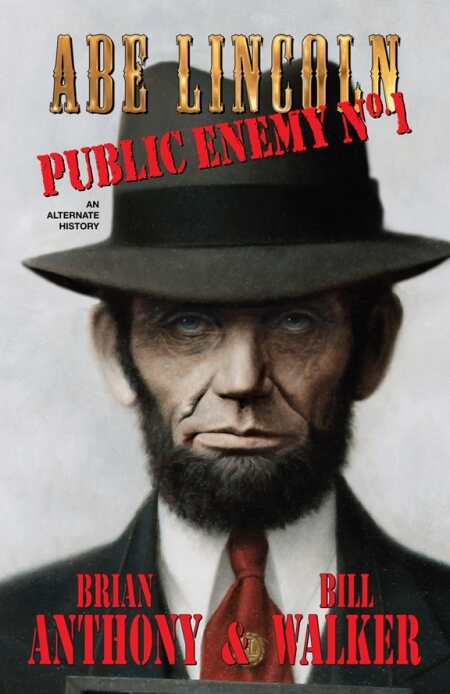Abe Lincoln: Public Enemy No. 1
Lincoln, emancipated at last from the nineteenth century, finds a job more honest than the presidency: “String Bean” is a thug with morals.
In 1976, while they were students at Emerson College, Brian Anthony and Bill Walker made a short film called Abe Lincoln: Public Enemy No. 1, and now here they are in 2013 with a delightful variation. The ingredients to what might seem to be a zany romp of a story are unlikely enough: a botched assassination attempt at the Ford Theater, a cover-up at the highest levels of government, a voodoo priest and his wise and loving granddaughter, and a depression-era outlaw gang—led by John Dillinger and including Baby Face Nelson and a long, lean ex-lawyer named “String Bean” (who bears a strong resemblance to a dead president). Add a vintage lead-ball derringer and a few Thompson submachine guns, and the result is a highly speculative and entertaining yet forthright historical novel.
If Lincoln had not died on April 14, 1865; and if Vice President Andrew Johnson and President Lincoln’s cabinet had reason to withhold this information from the public; and if Abe lapsed into a coma and eventually was secretly removed to his Springfield, Illinois, residence to be read to daily and spoon-fed by a nurse and his beloved son, Robert, while Mary Todd Lincoln ranted and rambled in her half madness about séances and the occult; and if Lincoln, restored to health in 1933 by a potion of magic powders (while not having aged one iota), petitioned for his old job before a reluctant President Franklin D. Roosevelt; and if FBI Director J. Edgar Hoover impounded Lincoln’s savings, and Abe joined the Dillinger Gang and robbed federal banks to recover that which his government had stolen from him … these are just a few of the “what ifs” considered and woven into something intricate and engaging by Anthony and Walker.
And the Lincoln rendered by the coauthors is not unlike the president whom Americans have come to revere—honorable, caring, and courageous; a brilliant, witty man who loved to tell stories. When Mary Lincoln complains that General Ulysses S. Grant, who declined their invitation to join them at the Ford Theater, “reeks of whiskey and cigars,” Abe replies, “It’s just as well he is on his way to New Jersey,” and adds that if he knew the brand, he would send a barrel of Grant’s whiskey to every general in his army. Resurrected almost seventy years later as an associate of Dillinger, Lincoln remains himself, now a Robin Hood-like figure who insists that no one get hurt. When a local hard-luck farmer offers Abe his wallet during a robbery in Daleville, Indiana, String Bean says, “Keep it. We’re here for the bank’s money, not yours.”
Clever and swiftly moving, yet with surprising attention to historical detail, this is a work of popular fiction that should satisfy a wide audience—the general reader as well as the history buff. And Anthony and Walker leave no loose ends. Fittingly, Dillinger meets his fate at the Biograph Theater in Chicago by the gun of the same FBI agent who pursued him in real life. Lincoln’s fate cannot be revealed here, but back in the 1970s at Emerson, Anthony and Walker planned two other films, one about Abe at Hiroshima, the other a “zombie epic” called Dawn of the Prez. Maybe they will revive an old project and free the Great Emancipator once again.
Reviewed by
Joe Taylor
Disclosure: This article is not an endorsement, but a review. The publisher of this book provided free copies of the book and paid a small fee to have their book reviewed by a professional reviewer. Foreword Reviews and Clarion Reviews make no guarantee that the publisher will receive a positive review. Foreword Magazine, Inc. is disclosing this in accordance with the Federal Trade Commission’s 16 CFR, Part 255.

